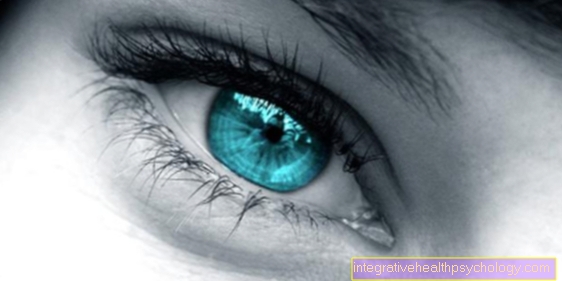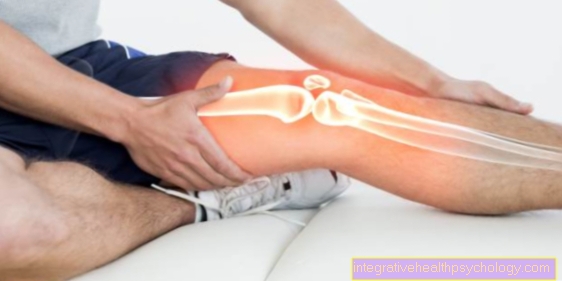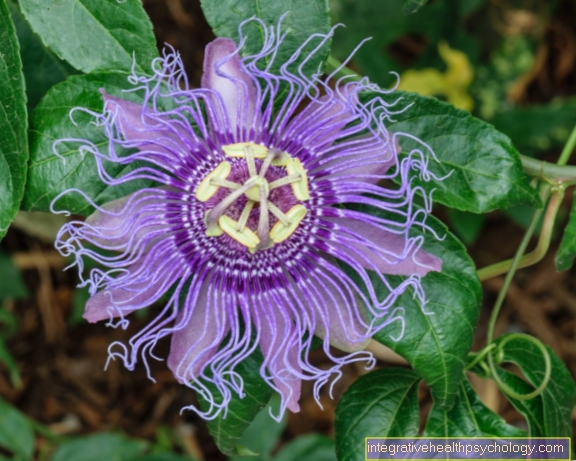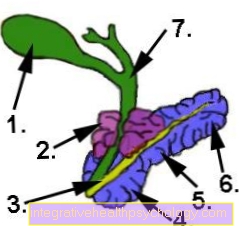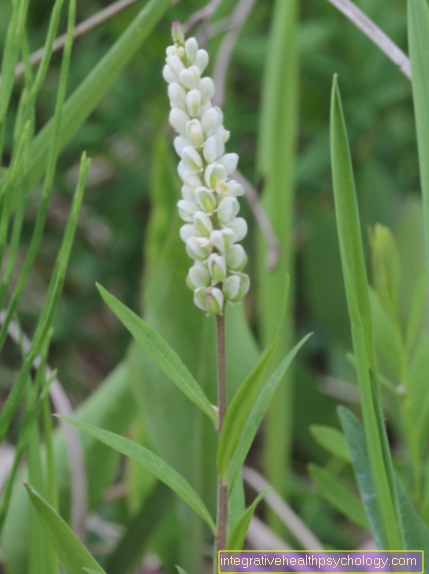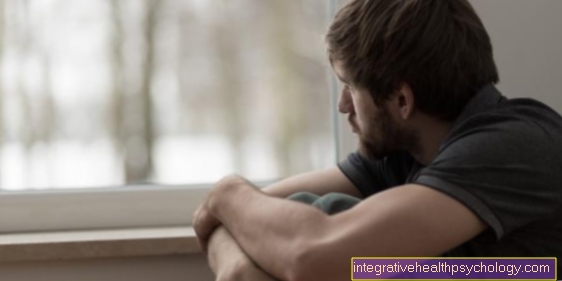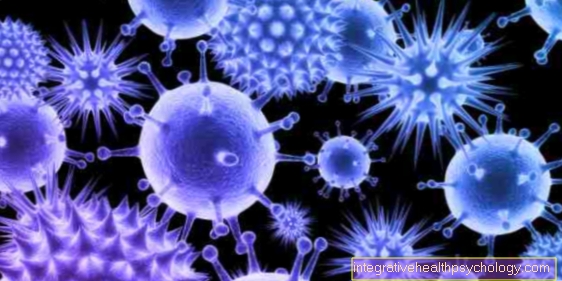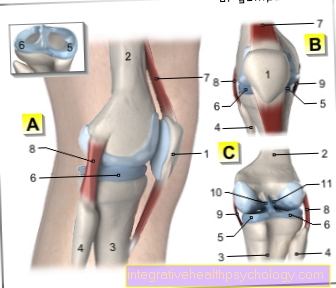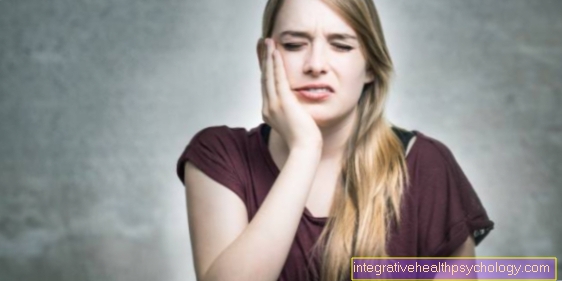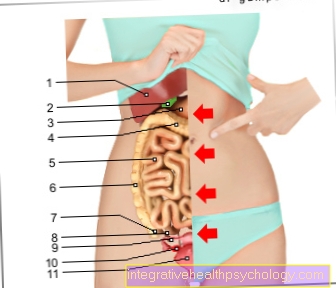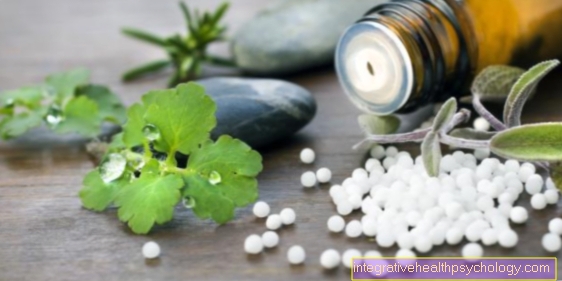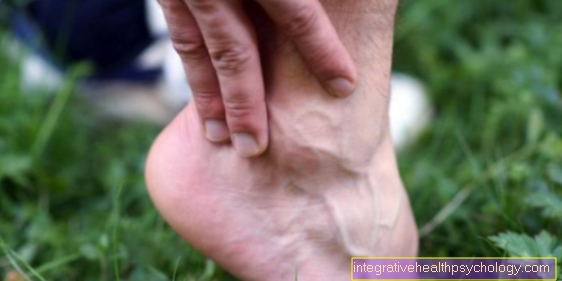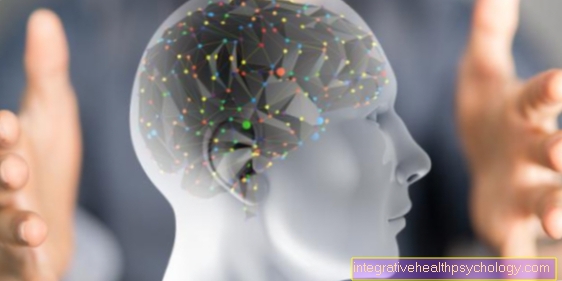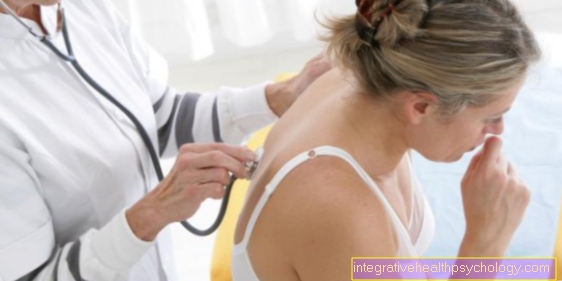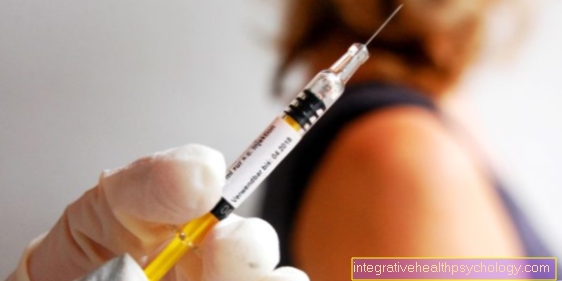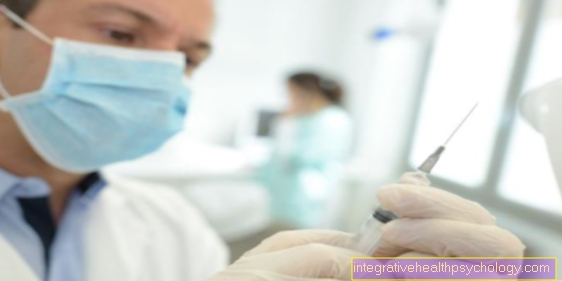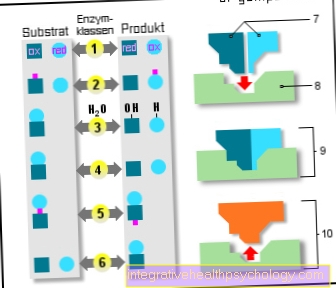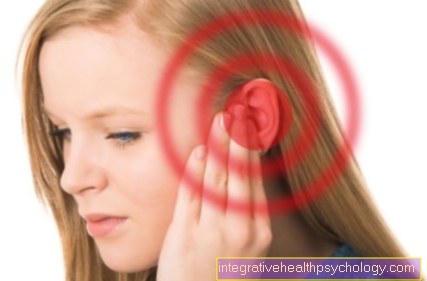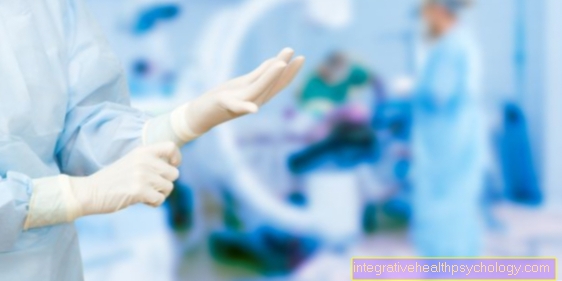Kidney pain after a bladder infection
definition
Kidney pain that occurs during or after a bladder infection is not uncommon. However, they should always be taken as a warning signal, because a delayed cystitis can also lead to kidney inflammation (Pyelonephritis) expand. This should be clarified by a doctor and treated with antibiotics, as otherwise it can lead to serious complications.
Read more on this topic: Kidney Inflammation and How Can I Relieve Kidney Pain?

causes
Kidney pain that occurs after a bladder infection can be an indication of the onset of a kidney infection. The cause for this are bacteria that have triggered the bladder infection and ascend via the urinary tract towards the kidneys (ascending Inflammation) and there in turn trigger an inflammatory reaction. Usually such an inflammation affects only one of the two kidneys, but can also occur on both sides. Due to their anatomy, women are affected 2-3 times more often than men.
Kidney pain occurs less often as a harmless accompanying symptom in the context of a cystitis. More typical symptoms of a bladder infection are painful urination and an increased need to urinate.
Furthermore, kidney pain that persists after a bladder infection can also occur independently of this, for example in the context of renal colic with kidney stones.
Otherwise, flank pain in the kidney area also occurs due to neuromuscular Symptoms such as sore muscles or impairments in the spine area. However, these cannot be attributed to diseases of the kidney.
Read more on this topic: Causes of Kidney Pain and Differentiation from Kidney Pain to Back Pain.
Kidney pain on the left side after a bladder infection
As already described above, unilateral kidney pain that occurs during or shortly after a bladder infection requires clarification if it lasts for a long time or is acute and severe, as it can be an indication of the development of a kidney inflammation. Unilateral, colicky kidney pain can also occur with kidney stones.
Kidney pain on the right side after a bladder infection
As with kidney pain of the left side, possible causes of right-sided kidney pain after a bladder infection are pelvic inflammation or kidney stones. The pain associated with cystitis can occur less often and has no specific cause.
Concomitant symptoms

If the pain in the kidney area is inflammation of the kidney pelvis, accompanying symptoms such as high fever, Exhaustion, Loss of appetite and nausea occur.
If the kidney pain occurs only as a harmless accompanying symptom in the context of cystitis, pain often occurs, respectively Burning sensation when urinating (Dysuria) and constant need to urinate (Pollakiuria) as accompanying symptoms.
Accompanying one Kidney stones often occur strong Restlessness, nausea and Vomit on.
nausea
Kidney pain associated with nausea can be next to one Pelvic inflammation for example, indications of the presence of Kidney stones be. If a kidney stone moves through the urinary tract, it can cause severe pain. This very strong, intermittent and cramp-like pain is called renal colic designated. Such colic is often accompanied by nausea and vomiting.
It is rather uncommon for the symptoms of kidney pain and nausea to be causally related to a single bladder infection. It is more likely that the two complaints are justified independently of one another.
diarrhea
The simultaneous occurrence of kidney pain and diarrhea after a bladder infection are no findings that typically occur together. As described above, kidney pain can have several causes. Diarrhea, on the other hand, usually has a cause independent of kidney pain and cystitis.
Blood in the urine
Blood in the urine can have several causes. There is a certain one Form of cystitis associated with blood in the urine. We're talking about one hemorrhagic cystitis.
Also Kidney stones often cause bloody urine.
Rare is a tumor bladder or urinary tract responsible for blood admixture with urine.
therapy

If you have kidney pain after a bladder infection, it can be harmless. However, it can also be an indication of a more serious condition like pelvic inflammation. Therefore should one-sided, severe or persistent complaints A doctor should be consulted. He can decide whether further diagnostics are necessary and to what extent antibiotic therapy is necessary.
The pain is not related to such an inflammation but occurs as a side effect of cystitis so the question of alleviating the symptoms is in the foreground. Here can Heat application, for example with a hot water bottle or a cherry stone pillow, help. A warm bathtub or red light irradiation of the feet can also help.
Kidney pain in general can be caused by numerous Painkiller reduce or eliminate completely. Preparations like Paracetamol or Novalgin are used here.
Kidney pain after a bladder infection despite antibiotic therapy
If kidney pain occurs as part of a bladder infection with ongoing antibiotic therapy, this can be an indication that the antibiotics are not working. The reason for this may be that the chosen antibiotic not suitable for the bacteria that caused the cystitis.
Since, as described above, it can also be an inflammation of the kidney pelvis, the treating family doctor should be consulted if the symptoms persist. He or she can decide whether to switch to another antibiotic.
Kidney pain after a bladder infection during pregnancy
Kidney pain in pregnancy that occurs after a bladder infection should be carefully diagnosed. Often there is something harmless behind it. Sometimes kidney pain occurs during pregnancy without a cause being found. Other possibilities can be back pain (sore muscles), which radiate into the flank area.
But the possibility of kidney inflammation, which may have developed from the cystitis, must also be considered. Any cystitis during pregnancy should be treated with antibiotics. Therefore, the likelihood of developing kidney inflammation is reduced. However, it can happen that the chosen antibiotic does not attack the desired pathogens, so that they can spread further.
Kidney pain after a man's cystitis
If a man develops kidney pain after a bladder infection, the possible causes are the same as in a woman. As a rule, cystitis in men - in contrast to women - treated with antibiotics. If you still experience pain, this can be an indication that the antibiotics are not effective in this case and you must switch to another drug.
In general, however, kidney pain is not a typical symptom of a bladder infection. They should serve as a warning signal for the presence of a kidney inflammation and should be further clarified, both in men and women.
Duration
The duration of kidney pain that occurs after a bladder infection depends largely on the cause. The discomfort occurs as a harmless side effect of cystitis on so they should be within less days have subsided. Applying heat here can accelerate pain relief. Kick the Pain associated with an inflammation of the kidneys in this way the pain usually persists to a Treatment with antibiotics is initiated.

